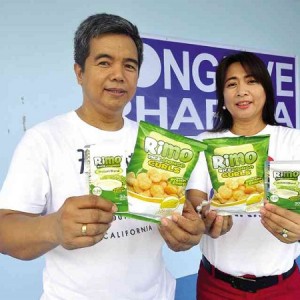Pangasinan firm produces veggie-based snacks to solve malnutrition

RACKY Doctor, president of Long Live Pharna, and wife Divine, finance officer, display RiMo curls and RiMo instant baby food blend, their company’s newest products. WILLIE LOMIBAO/CONTRIBUTOR
STA. BARBARA, Pangasinan—When local businessman Racky Doctor was asked two years ago if he would like to venture into food manufacturing, he did not hesitate to take up the challenge.
To him, the offer was a rare opportunity to expand his thriving water disinfectant business and at the same time support an advocacy that promotes proper nutrition among children.
The offer came from the Food and Nutrition Research Institute (FNRI) of the Department of Science and Technology (DOST) and the products were snack food for children 2 years old and above and a food blend for babies 6 to 24 months old, both made from rice and mongo grains.
The project was part of DOST’s science and technology-based intervention program to address malnutrition among children in the country.
“They were talking about the big need for entrepreneurs to help solve malnutrition in the country. I saw the need for participation. And since I was passionate about making new products, especially food, I grabbed that opportunity,” Doctor says.
An FNRI-DOST study states two of 10 Filipino children up to 5 years old are underweight for their age and three of 10 are short for their age.
But Doctor would find out much later that putting up a food manufacturing plant would cost him a fortune, which he did not readily have at that time.
Under the scheme, FNRI-DOST would provide the technology and the formula for the products while he would put up the plant and the capital to jumpstart the business.
“It took me a lot of guts and courage to pool the needed capital because the [cost of the] machinery alone was no joke,” Doctor says. He says he had to sell property in Kalinga, borrow money from a bank and bring out his savings to raise at least P10 million.
“It’s good I already have the buildings for Hyposol. I just had to renovate a big part of it in accordance with the standards of good manufacturing practice for the food products,” Doctor says.
Hyposol is a water disinfectant that Doctor’s company, Long Live Pharma, developed after the cholera outbreak in Pangasinan in 2004. He has been manufacturing it in a half-hectare plant in Barangay Malanay here.
When the food product manufacturing equipment was finally fabricated and installed here, his plant was inaugurated on May 6. Nine days later, the plant started producing RiMo curls and RiMo instant baby food blend.
“These products are actually complementary food for children developed by FNRI-DOST,” Doctor says.
“The products are made from a blend of rice flour and mongo flour. They are rich in protein and energy. Children who will consume a pack a day of these for 120 days can have the right nutrition that they badly need in their age,” he says.
RiMo curls, which is produced in 30-gram packs, has 120 kilocalories and 4 grams of protein, which, Doctor says, is enough to meet the daily recommended energy and protein intake of children.
RiMo instant baby food blend is a ready-to-eat food that can be consumed by adding previously boiled water.
Doctor says he designed the label of the curls pack to make it look like the popular “chichirya” (snack food) in the market.
“Children are usually attracted to chichirya. But what makes our chichirya different from the rest is its healthy ingredients,” Doctors says. “Besides, ours is a lot cheaper, P7 for the instant baby food blend and P8 for the curls.”
With the products out in the market, Doctor says his biggest challenge is sustaining his operations in terms of coming up with a big inventory.
He says that the demand is high, coming mostly from schools, government agencies involved in feeding programs and even local governments.
“This means I also have to put up a lot of inventory of raw materials,” he says.
He says his plant can produce up to 16,500 packs of curls and baby food blend a day. “But we have not gone on a full-blast operation yet. We are producing only about 6,000 packs a day,” he says.
His wife Divine and daughter Khristyna, a registered nurse, are helping him market the products by organizing feeding programs and meeting various interest groups.
“I hope to display my product in every sari-sari store in the country. But of course, that will require a lot of capital,” Doctor says.
So far, he says, his products have reached parts of Metro Manila, the Cordillera and the Ilocos provinces.
“We have also been sending these to some provinces in the Visayas and Mindanao. We actually receive a lot of orders from there,” Doctor says.
He says his wife, who is the company’s finance officer, is working on a website that would feature the products and allow online orders and payments.
He says that despite the absence of advertisements, the popularity of his products has been increasing and his office receives several inquiries every day.
“The challenge that was given to me by the FNRI-DOST is to manufacture and commercialize these products at the same time. I’m now beginning to see that these are not really very difficult to sell. My advantage is that I’m selling a nutritious product,” he says.














